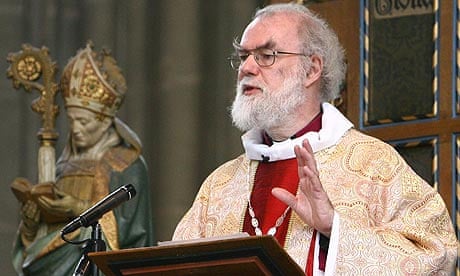The Church of England should harness public disillusionment with materialism to encourage people to pursue a monastic lifestyle, the archbishop of Canterbury said in his Easter sermon.
Rowan Williams said there could "hardly be a more propitious time" to promote a life of prayer and self-sacrifice than during the global economic crisis, which had "dealt a heavy blow" to the idea that people could gain fulfilment from a materialistic lifestyle.
"The present financial crisis has dealt a heavy blow to the idea that human fulfilment can be thought about just in terms of material growth and possession," he told the congregation at Canterbury Cathedral.
"Accepting voluntary limitation to your acquisitiveness, your sexual appetite, your freedom of choice doesn't look so absurd after all as a path to some sort of stability and mutual care. We should be challenging ourselves and our church to a new willingness to help this witness to flourish and develop."
Williams said people remained fascinated by the monastic lifestyle, as demonstrated by several TV programmes on the subject. BBC2 enjoyed a surprise hit with The Monastery, a reality TV show in which members of the public spent six weeks living alongside monks, which was followed by similar shows set in a convent and an Islamic retreat.
Writing in the Mail on Sunday, the archbishop said the financial crisis had shown the materialistic pursuit of "cash, status and pleasure" in recent decades had led to "dissatisfaction and resentment". He said the rise of individualism and the belief "that we simply have a right to get whatever we want" had set people against one another and made people think they had a right to be angry if they did not get want they thought they wanted.
Pope Benedict said in his Easter message that the world needed to rediscover hope to end wars, poverty and financial turmoil.
"At a time of world food shortage, of financial turmoil, of old and new forms of poverty, of disturbing climate change, of violence and deprivation which force many to leave their homelands in search of a less precarious form of existence, of the ever-present threat of terrorism, of growing fears over the future, it is urgent to rediscover grounds for hope," he told the crowds who packed St Peter's Square in Rome.
The pope, who plans to travel to the Middle East in May, said reconciliation was the only way to resolve the Israeli-Palestinian conflict.
"Reconciliation, difficult but indispensable, is a precondition for a future of overall security and peaceful coexistence, and it can only be achieved through renewed, persevering and sincere efforts to resolve the Israeli-Palestinian conflict," he said.
The new leader of the Roman Catholic church in England and Wales, Archbishop Vincent Nichols, said homosexuality was not a sin, when questioned about the former prime minister Tony Blair's call for the Vatican to change its stance on gay relationships.
Nichols, who was appointed as archbishop of Westminster by the pope last week, said on Sky News: "Homosexuality is not a sin.
"A person who is of a homosexual orientation is as worthy and as dignified as anybody else and one of the things I regret about our society is that it tends to identify people by their sexual orientation, and that is diminishing of a person. Nobody should be put in a box because of their sexuality."
The archbishop of York attacked the "glory-hunting" decision to stage two Premier League football matches today, claiming it showed disdain for religious tradition. John Sentamu said the games between Aston Villa and Everton, and Manchester City and Fulham should have been moved to make Easter Sunday as important as Christmas Day.
He told the News of the World that football clubs such as Aston Villa and Everton should remember they were originally set up by churchgoers.
